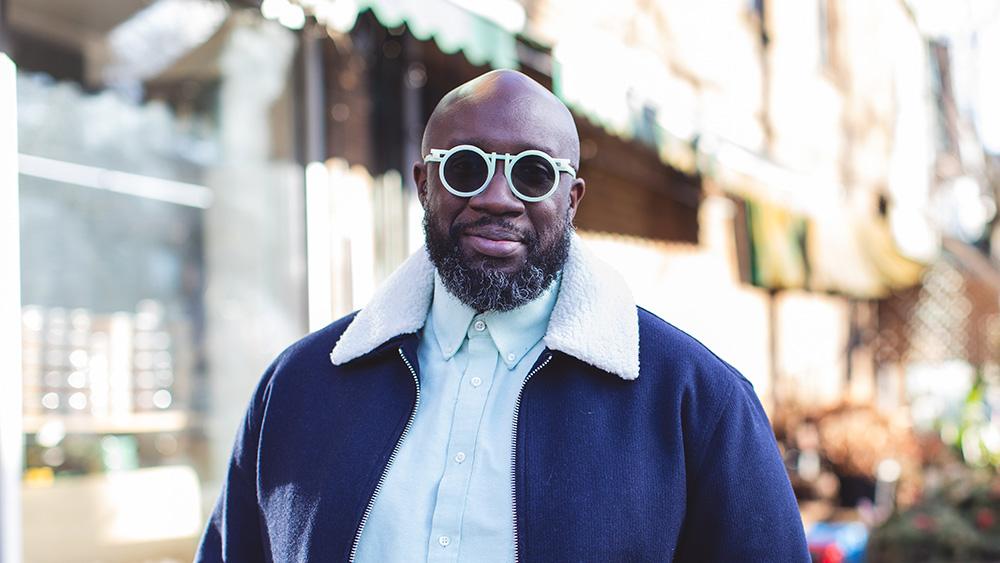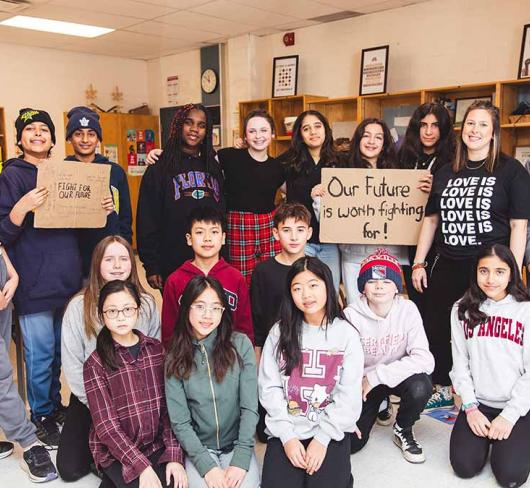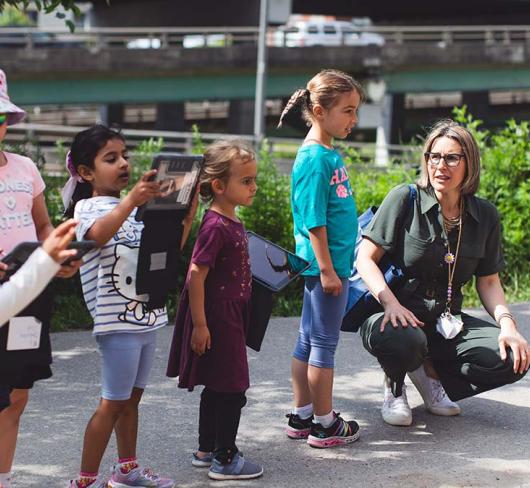
Building in and with Community
Fadumo Deria: Paul, as an educator, I am so happy to have this conversation with you about the anti-poverty work you have been doing for many years as an activist, as executive director of FoodShare Toronto and now as a consultant and public speaker. I want to start by asking, what does community mean to you?
Paul Taylor: We’ve come so far from what community means. We’ve forgotten how important and impactful it is to be a part of our community and how important it is to think of ourselves as members of communities. For me, I think about community as a space of accountability, folks who hold me accountable, who support and challenge. But also, I think a lot about my experience as a child feeling like it was community that helped us stay alive in really difficult times. That has been one of my takeaways. Community means making sure that we are caring for those that have been made to suffer the most – and I say, made to suffer intentionally. I reject that language of vulnerable people, marginalized people; I don’t think people are born vulnerable or marginalized. Our systems, our politics, politicians that don’t care, bad bosses, those are the people that make others vulnerable and marginalized. So, I think that’s important to contextualize. And it’s often in community and with community that we push back and fight back against the systems that inflict harm and needless pain on members of our communities.
FD: That leads me to my next question, and you’ve touched on this a little bit, but how has community informed your activism work? Who inspired you? Was there a turning point that led you to this path?
PT: Growing up raised by a single mom in a low-income household, we were materially poor; we struggled a lot. And I remember my mom being really nervous around an election, I think it was 1995, I was 13. And I didn’t really understand why she was so nervous or what was happening. But I could sense that this was big. So, I guess I tuned in a little bit more, and I learned that this man named Mike Harris was running to be the premier under the guise of something called a “common sense revolution.” We were on welfare and at the time, there was a minister of social services who talked about the welfare diet. He said poor people on welfare get more than enough money to survive; they can get dented tins, having pasta without sauce, bread without butter. Those statements really got me thinking there actually isn’t a problem with my family, we haven’t done something wrong. Our experience has been determined by political decisions that don’t centre us or seek to improve our situation. That was a turning point for me. It helped me realize that if I was going to see change for folks who are having similar experiences to me, and I’m thinking here about kids who are going to come after me, I just didn’t want them to struggle in the same way. It was at that moment that I realized that this is not personal, this is not something to fight with my mother about. This is something to fight with our elected officials about. And I think, since then, I’ve focused a lot of my activism on challenging our politicians to really lead in the ways that I’ve seen my mother, my grandmother, my great-grandmother lead. To call on them to not only use the resources available to them to take care of those that are struggling the most, but also, to dream and build with us. That is what I want to see our politicians doing and not treating us as an afterthought.
FD: The University of Toronto published research showing that 1.8 million children live in food insecure households in Canada. For educators, we know that some of those children will be in our classrooms. Can you share any practical strategies that would support educators’ efforts to bring awareness and teach about food security in a way that extinguishes the shame and stigma that surrounds it?
PT: I think we’ve got to reject this narrative that the solution is charity, that the solution to food insecurity is somebody else’s leftovers. There is shame built into that model, people are going to feel shame when you’re giving them your day-old Starbucks muffins. So, while folks might feel compelled to continue to participate in those sorts of interventions, because it’s what we’ve been taught we ought to do, especially during the holidays, I would encourage educators to really think about the political element of food insecurity. Educators can help young people recognize that this issue of food insecurity, it’s actually not about hunger. Food insecurity actually has less to do with food and more to do with families having enough money to purchase the food that they need. Those are the conversations we need to be having with young people. Why do we live in one of the richest countries in the world, but people still don’t have the money they need to purchase the things they need, especially fundamentals like food. Instead of talking about donating to charity, or maybe alongside donating to charity, if that’s been a long-standing tradition, I’d love to see educators talking about the right to food. Last count in 2022, 6.9 million people in Canada live in food insecure households. We’re not going to solve that with three-legged carrots or leftover muffins or cranberry sauce that we haven’t been able to use for a number of years. We’re going to solve this by understanding why it is that we allow people to get left behind, and really having conversations about what are the levers that change this situation for the better. I’m talking about improving social assistance rates, increasing minimum wages, opening more affordable childcare spaces. What are the things that we need for people to be able to thrive and have access to the food that they need? That’s what I’d love to see children engaged in conversations about.
FD: Okay, so these wonderful strategies that you’ve just shared with us, how do they connect with educating students about sustainability and the connections between climate, social and economic justice?
PT: I think sometimes it makes sense to connect issues. The climate crisis is significant, it is having an impact on food. But I sometimes actually get a little concerned about connecting food insecurity to the climate crisis. We produce billions of dollars’ worth of food waste each year and this has horrible impacts on the climate, certainly. The resources that have gone into producing this food, which is thrown away, are wasted. That’s a huge problem that needs to be addressed for a whole host of reasons. But I worry when these issues get connected because what people are starting to say is, hey, we’ve got all this food waste. And we’ve got at least 6.9 million people that are food insecure. Why don’t we just match these people up with the leftover food. That doesn’t address the underlying issues. We’re telling low-income people that despite the fact that we know income-based interventions work, their rights don’t matter. They are walking compost bins. And I think that is very dangerous. There’s lots of excitement around three-legged carrots and ugly potatoes, or what would otherwise go into the waste stream. That’s important but shouldn’t distract us from people having the money that they need to purchase the food that they need. So while in some ways these issues are connected, they’re also issues that I think we should look at separately.
FD: Agreed. All right. So back to the classroom, and our own communities. If you could imagine a starter kit for conversations about food security in the classroom, what else would you include? What tools would be in there? And how can educators get their students more involved to create community awareness and support?
PT: I really am a huge fan of the work of PROOF, an interdisciplinary research program out of the University of Toronto studying effective policy approaches to reducing household food insecurity. They have done a really great job making this issue accessible. I really appreciate the work that they’ve done to break this issue down, explain it to people in ways that make sense, and I think in ways that would make sense to children. I’ve certainly leveraged their resources to talk to people, including young people, about the realities of food insecurity and poverty, anti-Indigeneity and anti-Black racism, and how those intersect.
FD: In the face of growing resistance to social justice work, people in activist circles can become exhausted, mentally, physically, spiritually, emotionally. How do you stay sustained? How do you find the power and strength to keep going? Where do you pull from to fill your cup and keep coming back to do what’s needed?
PT: Oh, yeah. Now this is such an important question. You know, one of my favorite things to say now, and it took me a while to embrace it, is no. And that’s because I have learned that I can’t do everything for everybody. And if I try to, I will do it poorly. I recognize where I can influence things and where I can’t influence things. I know that I’m responsible for taking care of myself as best I can. So that involves me saying no, it involves me sitting in the sun and just thinking, it involves me cooking and spending time in community with friends and family. And we have this idea of self-care as something that is reserved for middle-class white people, but I think leaning into our ability to rest and to enjoy and to play is critical to our well-being. Those are the things that allow me to feel energized and give me perspective, allow me to look away for a moment so that I can look back and, you know, still feel energized by the work ahead. And so I think that for me is so important. Good food, good rest and time spent eating and being with loved ones.
FD: I had the honour of hearing you speak at the ETFO Annual Meeting this past summer and you mentioned standing on the shoulders of those before you. I know you touched on this earlier in our conversation, but could you share more about who inspires you to do the work that you do?
PT: Absolutely. Bernadine Taylor, Rebecca Thompson and Maisie Baker – my mother, my grandma and my great-grandmother. Three Black women who came before me and taught me so much about leadership, so much about community and caring and commitments. For me, it is really important to not only acknowledge the contributions that they’ve made for me personally but to also be doing all I can to support Black women in my work. Black women are doing so much of the heavy lifting to keep our communities going, keep them fed, nourished, nurtured, challenged. I think one of the best things that I can do is use the resources available to me as best as possible to support Black women in doing that work.
FD: Amazing. So lastly, this magazine reaches 83,000 elementary educators in Ontario. Is there anything that you would like to share as a final message?
PT: I just want to thank educators for the work that you do. I’m so grateful. And I also want to say that the status quo, when we walk down the street and see people that are houseless, hear stories of people not having enough food to eat or not being able to afford their medication, it doesn’t have to be that way. It’s up to all of us to really stand up and say, we want to see better for everyone. In one of the richest countries in the world, if we all stood up and said, we want to see people cared for much better, I think our politicians would have to listen. Let’s not lose sight of the fact that something far better is possible. Let’s keep dreaming in colour and let’s keep imagining the world we want to create together.
Fadumo Deria is a member of the Ottawa Carlton Occasional Teacher Local.

